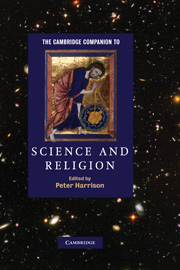Book contents
- Frontmatter
- Introduction
- Part I Historical interactions
- 1 The fate of science in patristic and medieval Christendom
- 2 Religion and the Scientific Revolution
- 3 Natural theology and the sciences
- 4 Religious reactions to Darwin
- 5 Science and secularization
- Part II Religion and contemporary science
- Part III Philosophical perspectives
- A guide to further reading
- Index
2 - Religion and the Scientific Revolution
from Part I - Historical interactions
Published online by Cambridge University Press: 28 July 2010
- Frontmatter
- Introduction
- Part I Historical interactions
- 1 The fate of science in patristic and medieval Christendom
- 2 Religion and the Scientific Revolution
- 3 Natural theology and the sciences
- 4 Religious reactions to Darwin
- 5 Science and secularization
- Part II Religion and contemporary science
- Part III Philosophical perspectives
- A guide to further reading
- Index
Summary
The Scientific Revolution has always played a prominent part in the historiography of science and religion. Historians typically use the expression 'Scientific Revolution' to refer to that period from the early sixteenth century to the late seventeenth, when something recognizably like modern science coalesced out of previously distinct traditions such as natural philosophy, the mathematical sciences and Renaissance magic. The importance of this period in science and religion discussions is largely owing to the causes célèbres provided by the Copernican theory in general (which defied the biblical pronouncement that the earth shall not be moved), and by Galileo's championing of the theory in particular. Second only to Darwinism, the Copernican revolution and the Galileo affair are all too often regarded as demonstrating clearly and irrefutably that science and religion just do not mix, and indeed are essentially incompatible with one another. But this view only came to be accepted in the late nineteenth century when science became, not a weapon to be used against religion, but a battlefield, over which both religionists and secularists fought. For the vast majority of us today religious belief is a matter of personal choice, but before secularism became the norm in the West God and religion were so pervasive in social, political and intellectual life that it seems fair to say that all but a very few intuitively thought in a religious way.
- Type
- Chapter
- Information
- The Cambridge Companion to Science and Religion , pp. 39 - 58Publisher: Cambridge University PressPrint publication year: 2010
- 9
- Cited by

